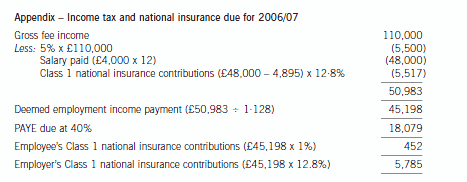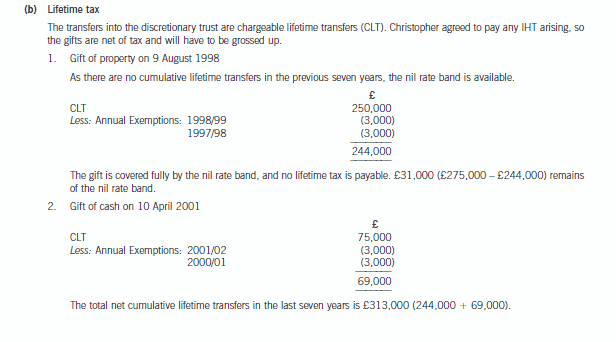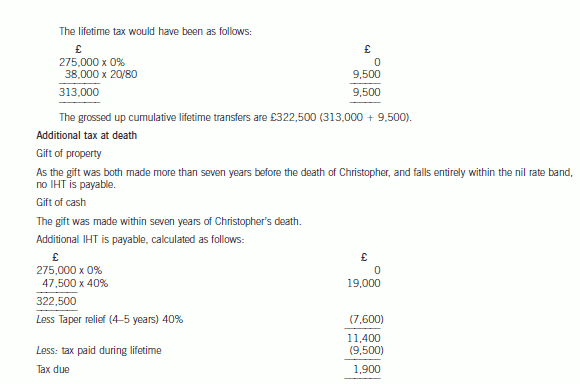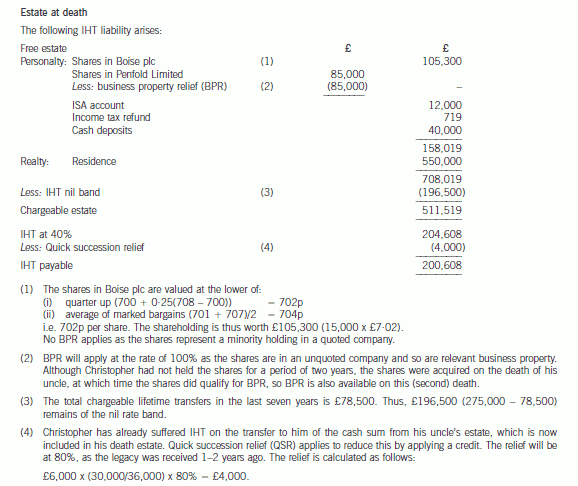ACCA官网中的登陆密码错误怎么办?了解一下!
发布时间:2020-02-05
报考ACCA的考生注意了!如果ACCA官网中的登陆密码错误怎么办?不知道的小伙伴快跟着51题库考试学习网一起来看看吧!
如果我们忘记ACCA全球官网中的登录密码怎么办?
如果你登录MYACCA密码输错了,超过三次,该用户就会被锁定,你在输正确的密码也进不去。
你可以通过邮件与英国总部联系,告知密码错误,他们会在三个工作日内给你换一个新密码。
然后通过邮件告诉你,你在他们更改密码半小时后,在登录就行了。
ACCA考试一直被当作是难度最大的会计资格考试之一,一方面是因为它是全英文的考试,其次还与它的13门考试有关。据了解,在以往报考ACCA的考生当中,能够一次备考的人远不足50%,换句话说,对于大多数ACCA学员来说都要经历挂科重考。
会计ACCA的就业前景好不好?
第一、从数量上来说,ACCA相对于其他专业人士的数目来说,人数稀少,但需求量大。ACCA会员目前在国内尚少,而作为高层管理高端型人才,以及越来越多的企业趋于国际化全球化的大变革中,企业对于ACCA的需求量是极大的。
第二、从个人职业发展来说,ACCA属于宏观统筹型人才。
相对于传统会计,ACCA更偏重于管理以及统筹、预测及规划企业走向及企业未来发展。这对于中国传统的应试教育来说是个非常好的互补,在获取知识用以解决实际问题这方面对于传统教学教育出来的学生是一次拓展思维训练的机会。调查中发现,在招聘网站中,大部分要求具有ACCA资格的职位有财务总监(CFO)、总经理助理、董事长助理以及首席财务官。这些职位要求应聘者不仅需要计算财务方面的专业知识,还需要有对于财务分析、部门配合、以及做出专业的报告让非财务人员理解并执行的能力。且多数外企要求CFO需具备中英文两种语言能力,这对于中国学生来说也是极大的优势。
以上就是51题库考试学习网带给大家的内容,如果还有其他不清楚的问题,请及时反馈给51题库考试学习网,我们会尽快帮您解答。
下面小编为大家准备了 ACCA考试 的相关考题,供大家学习参考。
6 Charles and Jane Miro, aged 31 and 34 years respectively, have been married for ten years and have two children
aged six and eight years. Charles is a teacher but for the last five years he has stayed at home to look after their
children. Jane works as a translator for Speak Write Ltd.
Speak Write Ltd was formed and began trading on 6 April 2006. It provides translation services to universities. Jane,
who ceased employment with Barnham University to found the company, owns 100% of its ordinary share capital
and is its only employee.
Speak Write Ltd has translated documents for four different universities since it began trading. Its biggest client is
Barnham University which represents 70% of the company’s gross income. It is estimated that the company’s gross
fee income for its first 12 months of trading will be £110,000. Speak Write Ltd usually agrees fixed fees in advance
with its clients although it charges for some projects by reference to the number of days taken to do the work. None
of the universities makes any payment to Speak Write Ltd in respect of Jane being on holiday or sick.
All of the universities insist that Jane does the work herself. Jane carries out the work for three of the universities in
her office at home using a computer and specialised software owned by Speak Write Ltd. The work she does for
Barnham University is done in the university’s library on one of its computers as the documents concerned are too
delicate to move.
The first set of accounts for Speak Write Ltd will be drawn up for the year ending 5 April 2007. It is estimated that
the company’s tax adjusted trading profit for this period will be £52,500. This figure is after deducting Jane’s salary
of £4,000 per month and the related national insurance contributions but before any adjustments required by the
application of the personal service companies (IR 35) legislation. The company has no other sources of income or
capital gains.
Jane has not entered into any communication with HM Revenue and Customs (HMRC) with respect to the company
and wants to know:
– When the corporation tax computation should be submitted and when the tax is due.
– When the corporation tax computation can be regarded as having been agreed by HMRC.
Charles and Jane have requested a meeting to discuss the family’s finances. In particular, they wish to consider the
shortfall in the family’s annual income and any other related issues if Jane were to die. Their mortgage is covered
by a term assurance policy but neither of them have made any pension contributions or carried out any other long
term financial planning.
Jane has estimated that her annual after tax income from Speak Write Ltd, on the assumption that she extracts all of
the company’s profits, will be £58,000. Charles owns two investment properties that together generate after tax
income of £8,500. He estimates that he could earn £28,000 after tax if he were to return to work.
The couple’s annual surplus income, after payment of all household expenditure including mortgage payments of
£900 per month, is £21,000. Charles and Jane have no other sources of income.
Required:
(a) Write a letter to Jane setting out:
(i) the arguments that HMRC could put forward, based only on the facts set out above, in support of
applying the IR 35 legislation to Speak Write Ltd; and
(ii) the additional income tax and national insurance contributions that would be payable, together with
their due date of payment, if HMRC applied the IR 35 legislation to all of the company’s income in
2006/07. (11 marks)


(b) Explain the advantages from a tax point of view of operating the new business as a partnership rather than
as a company whilst it is making losses. You should calculate the tax adjusted trading loss for the year
ending 31 March 2008 for both situations and indicate the years in which the loss relief will be obtained.
You are not required to prepare any other supporting calculations. (10 marks)
(b) The new business
There are two tax advantages to operating the business as a partnership.
(i) Reduction in taxable income
If the new business is operated as a company, Cindy and Arthur would both be taxed at 40% on their salaries. In
addition, employer and employee national insurance contributions would be due on £105 (£5,000 – £4,895) in respect
of each of them.
If the new business is operated as a partnership, the partners would have no taxable trading income because the
partnership has made a loss; any salaries paid to the partners would be appropriations of the profit or loss of the
business and not employment income. They would, however, each have to pay Class 2 national insurance contributions
of £2·10 each per week.
(ii) Earlier relief for trading losses
If the new business is operated as a company, its tax adjusted trading loss in the year ending 31 March 2008 would
be as follows:

3 Damian is the finance director of Linden Limited, a medium sized, unquoted, UK trading company, with a 31 July
year end. Damian personally owns 10% of the ordinary issued share capital of Linden Limited, for which he paid
£10,000 in June 1998. He estimates that the current market value of Linden Limited is £9 million and that the
company will make taxable profits of £1·4 million in the forthcoming year to 31 July 2007.
(a) Damian believes that Linden Limited should conduct its activities in a socially responsible manner and to this
end has proposed that in future all cars purchased by the company should be low emission vehicles. The sales
director has stated that several of his staff, who are the main recipients of company cars, other than the directors,
are extremely unhappy with this proposal, perceiving it as downgrading their value and status.
The cars currently provided to the sales staff have a list price of £19,600, on which Linden Limited receives a
bulk purchase discount of 6% from the dealer, and a CO2 emission rate of 168 grams/kilometre. The company
pays for up to £400 of accessories, of the salesmen’s own choice to be fitted to the cars and all of the running
costs, including private petrol. The cars are replaced every three years and the ‘old’ cars are sold at auction,
because they are high mileage vehicles.
The low emission cars it is proposed to purchase will have the same list price as the current cars, but the dealer
is only prepared to offer a bulk discount of 5% on these vehicles. Damian does not propose to make any other
changes to Linden Limited’s company car policy or practice.
Required:
(i) Explain the tax consequences of the proposed move to low emission vehicles for both the individual
salesmen and Linden Limited, illustrating your answer by means of relevant calculations of the tax and
national insurance (NIC) savings arising. (9 marks)
(a) (i) Individual salesmen
The taxable benefit is determined by the list price of the vehicle plus the cost of the accessories (£20,000) and the CO2
emission rate. The current vehicles have a CO2 emission rate of 168 grams/kilometre, so the benefit will be calculated
at the rate of 20% ((168 – 140)/5 + 15), resulting in a total annual car and car fuel benefit charge of £6,880 (20,000
x 20% + 14,400 x 20%). The low emission vehicles will be chargeable at the basic percentage rate of 15% resulting
in a total annual car and fuel benefit charge of £5,160 (20,000 x 15% + 14,400 x 15%). The salesmen will thus
make an annual income tax saving at their marginal rate of tax, i.e. £378 (1,720 x 22%) if they are basic rate taxpayers
and £688 (1,720 x 40%) if they are higher rate taxpayers.
Linden Limited
The current vehicles will be classed as ‘expensive’ cars based on the discounted list price plus the cost of the accessories
of £18,824 (19,600 x 94% + 400). The annual writing down allowances will thus be restricted to £3,000 throughout
the period of ownership, but there will be no restriction of the balancing allowance available on disposal. The low
emission vehicles will be eligible for a 100% first year allowance of £19,020 (19,600 x 95% + 400), but there will
also be a balancing charge on disposal equivalent to the sales proceeds. Therefore, the total of the allowances available
over the life of the cars will be effectively the same in both cases. As a single company with taxable profits of
£1·4 million, Linden Limited will pay corporation tax at the small companies marginal rate of 32·75% in the year to
31 July 2007, giving a tax benefit in that year of £5,247 for each low emission car purchased ((19,020 – 3,000) x
32·75%).
The company will also make an annual saving in terms of the Class 1A national insurance contributions payable on the
salesmen’s benefits of £220 ((6,880 – 5,160) x 12·8%). But, as these Class 1A contributions are deductible for
corporation tax, the net saving will only be £205 (220 x (100 – 32·75)%).
As the VAT liability payable on the provision of private fuel is based on engine capacity (not the CO2 emission rate) this
will not necessarily be affected.
(b) Calculate the inheritance tax (IHT) liability arising as a result of Christopher’s death. (11 marks)



声明:本文内容由互联网用户自发贡献自行上传,本网站不拥有所有权,未作人工编辑处理,也不承担相关法律责任。如果您发现有涉嫌版权的内容,欢迎发送邮件至:contact@51tk.com 进行举报,并提供相关证据,工作人员会在5个工作日内联系你,一经查实,本站将立刻删除涉嫌侵权内容。
- 2020-01-10
- 2020-04-09
- 2020-02-20
- 2020-01-10
- 2020-03-07
- 2020-01-10
- 2020-04-23
- 2020-01-09
- 2020-04-22
- 2020-01-10
- 2020-01-10
- 2020-01-10
- 2020-01-10
- 2021-06-26
- 2020-02-19
- 2020-05-18
- 2020-01-01
- 2020-03-21
- 2019-12-27
- 2019-07-20
- 2020-04-21
- 2020-04-14
- 2020-01-10
- 2020-01-09
- 2020-04-15
- 2020-08-13
- 2020-01-10
- 2020-01-10
- 2020-02-06
- 2020-04-30